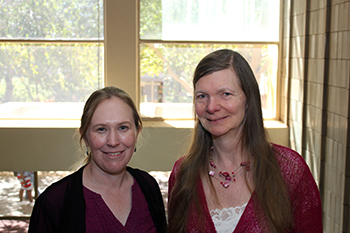Chemistry postgraduates tackle crystallography with eminent international researcher

Department of Chemistry senior lecturer, Dr Alice Brink(left),
hosted outstanding researcher, Prof Elspeth Garman (right)
from the University of Oxford in England to present a
crystallography lecture.
Photo: Rulanzen Martin
“Crystallography forms part of everyday life.” This is according to Prof Elspeth Garman, eminent researcher from the Department of Biochemistry, University of Oxford in England, who was hosted by Dr Alice Brink, Department of Chemistry at the University of the Free State (UFS) Bloemfontein Campus. Prof Garman presented a lecture in the Department of Chemistry, titled ‘104 years of crystallography: What has it taught us and where will it lead’. She also taught the postgraduate students how to refine and mount protein structures in cold cryo conditions at about -173°C.
What is Crystallography?
Crystallography is the scientific technique which allows for the position of atoms to be determined in any matter which is crystalline.
“You cannot complete Protein Crystallography without the five key steps, namely obtaining a pure protein, growing the crystal, collecting the data, and finally determining the structure and atomic coordinates,” said Prof Garman. Apart from teaching, she was also here to mentor and have discussions with UFS Prestige Scholars on how to face academic challenges in the professional environment.
Discovery of the first crystal structure of a TB protein
Prof Garman successfully determined the first crystal structure of a Tuberculosis protein (TBNAT), a project that took about 15 years of research. In partnership with the Department of Pharmacology at Oxford University and an outstanding PhD student, Areej Abuhammad, they managed to grow only one TBNAT crystal, one-fiftieth of a millimetre. They also managed to solve the structure and publish it.
Dr Alice Brink, Senior Lecturer in the Department of Chemistry, says, “It’s an incredible privilege to have Prof Garman here and to have her share her wisdom and knowledge so freely with the young academics.”